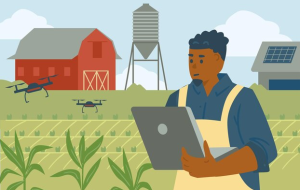Blockchain technology has been making waves across various industries, but its application in the agricultural sector offers groundbreaking potential, especially for small farmers in Africa. These farmers often face numerous challenges, including limited access to financial services, lack of market information, and difficulties in achieving fair pricing for their produce. However, distributed ledger technology could be the game changer that addresses these critical issues, providing financial opportunities and enhancing their livelihoods.
With the inherent transparency and security that blockchain offers, it stands to revolutionize the agricultural landscape. From improved traceability in supply chains to enabling secure financial transactions, its application is vast. Let’s delve deeper into how this innovative technology can transform the agricultural sector in Africa.
Unlocking financial access with blockchain technology

One of the most significant barriers for small-scale farmers in Africa is access to financial services. Traditional banking systems often overlook these farmers due to high loan default risks and lack of collateral. However, blockchain technology can facilitate greater financial inclusion by offering alternative ways to access credit through decentralized platforms. Decentralized finance (DeFi) platforms built on blockchain provide peer-to-peer lending services, enabling farmers to secure loans directly from investors without intermediaries.
This system reduces the overhead costs and offers more favorable loan terms, making finances more accessible and affordable for small farmers. Moreover, using blockchain, financial transactions become more secure and transparent. Every transaction is recorded on a tamper-proof ledger, ensuring that financial dealings are transparent and verifiable. This transparency can instill greater trust between lenders and borrowers, facilitating more financial support for farmers.
Enhancing market access and fair pricing
A critical challenge that African farmers face is getting fair prices for their produce. Intermediaries often dominate local supply chains, taking a significant share of the profits. Blockchain can disrupt these traditional systems by connecting farmers directly with buyers, ensuring that they receive better market rates. Smart contracts, integral to blockchain technology, can automate and enforce fair trading terms without the need for a middleman.
This automation ensures that farmers receive timely payments and agreed-upon prices for their products, fostering trust and reliability within the marketplace. With the integration of blockchain technology, market access can also be greatly expanded. Farmers can reach international buyers more easily, facilitating a global market presence that was previously unattainable. This broadened access can lead to increased income and a more stable economic future for smallholder farmers.
Improving supply chain transparency
The agricultural supply chain is often complex and opaque, making it difficult for consumers to verify product origins and quality. Blockchain technology can provide the transparency needed throughout the supply chain, from farm to table. By recording every transaction and movement of goods on a blockchain, consumers can easily trace the journey of their food.
This information empowers consumers to make informed decisions and gives farmers recognition for their products, potentially commanding higher prices for quality goods. Furthermore, transparency can help in identifying inefficiencies and reducing waste in the supply chain. By having a clear view of the product journey, stakeholders can optimize processes, resulting in cost savings and improved sustainability.
Real-world applications and case studies
Several initiatives in Africa have already begun harnessing the power of blockchain to transform agriculture. These projects provide valuable insights into the potential benefits and challenges of implementing blockchain in this sector. In Tanzania, startups are using blockchain to provide smallholder farmers with a digital identity, enabling them to access financial services and engage with new markets.
This digital identity helps in building a credit history, which is crucial for obtaining loans and insurance. Similarly, in Nigeria, blockchain-based platforms are being used to ensure provenance and quality of agricultural produce. By verifying the authenticity and quality of goods, Nigerian farmers can gain better market access and command higher prices for their products.
Challenges in adopting blockchain
Despite its promise, the adoption of blockchain technology in agriculture does not come without challenges. Infrastructure issues, such as limited internet access and technical knowledge, can hinder implementation in rural areas. Educational initiatives are essential to equip farmers with the knowledge needed to use blockchain-based platforms effectively.
Training programs and partnerships with technology companies can help bridge this knowledge gap, ensuring that farmers can leverage this technology to its fullest potential. Moreover, regulatory challenges may arise, as blockchain operates outside traditional financial systems. Governments and policymakers need to create supportive regulatory frameworks that encourage the growth and adoption of blockchain in agriculture.
The future of African agriculture with blockchain
As blockchain technology continues to evolve, its applications in agriculture could expand further, offering countless opportunities for innovation and growth. By tackling financial inclusion, market access, and supply chain transparency, blockchain holds the promise of transforming the lives of smallholder farmers across Africa. Continuing collaboration between governments, technology companies, and agricultural organizations will be crucial in realizing this potential. By pooling resources and expertise, stakeholders can create an environment where blockchain can flourish, ultimately benefiting the entire agricultural ecosystem.



